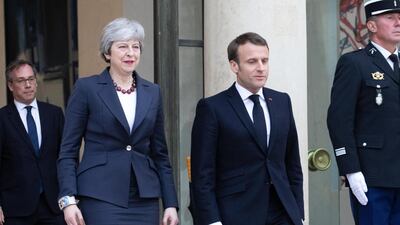European Union leaders are set on Wednesday to discuss plans to offer the UK a long delay to Brexit and prevent it from crashing out of the bloc without a deal this week.
British Prime Minister Theresa May wants to postpone the country's departure date until June 30, after failing to get her exit plan through parliament.
Arriving in Brussels Mrs May said she would be "clear" she was only after a short extension.
"I want us to be able to leave the European Union in a smooth and orderly way as soon as possible and that's what I am going to be working for," she said
EU leaders are unlikely to agree to such a short delay as there few signs that Mrs May can build a consensus in parliament, despite holding discussions with the opposition.
"The UK is in a difficult position - they have got themselves into a fix. They do not want to leave without a deal. We need to show them some flexibility and give them a bit of time," said Irish Prime Minister Leo Varadkar.
Donald Tusk, the President of the European Council, said there was little reason to believe a deal would be agreed by the end of June.
He has advocated a delay of up to a year, an extension that could be cut short if Britain reaches an agreement.
“Given the risks posed by a no-deal Brexit for people and businesses on both sides of the English Channel, I trust we will continue to do our utmost to avoid this scenario,” he said in a letter to EU leaders.
Any delay beyond June 30 would require the UK to hold elections to the European parliament, a move Mrs May has tried to avoid.
The UK’s Brexit Secretary, Stephen Barclay, said the country wanted to leave as early as possible. “I don't want to see a delay of up to a year,” he told the BBC.
The other 27 EU nations have to agree to delay Brexit, or the UK will leave the bloc on Friday without a deal. France has expressed concerns that a new hardline leader would replace Mrs May and try to disrupt EU decision-making, if there was a long delay.
Leaving the bloc without an agreement in place would likely lead to major trade, travel and transport problems. The International Monetary Fund said such a move would have a substantial effect on the UK economy.
But a long delay is likely to further frustrate Brexit supporters, who fear that delaying the UK's departure could allow the EU to scupper the whole project.
Britain planned to leave the EU on March 29 originally, but parliament remains split on the manner of the departure and how future relations with the bloc should develop.
Mrs May held talks with French president Emmanuel Macron and German Chancellor Angela Merkel on Tuesday in an attempt to rally support.
The party that supports Mrs May’s minority government in Westminster opposed her deal and said the prime minister's diplomatic efforts were humiliating for Britain.
Nigel Dodds, the leader of the Democratic Unionists in Westminster, said the UK was “effectively holding out a begging bowl to European leaders”.

